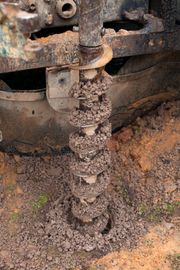FAQ About Water Well Drilling

Water well drilling is a fairly straightforward process — for the experts. Those who aren’t seasoned contractors, on the other hand, usually know next to nothing about how drilling rigs work. If you need to dig a well on your property, familiarize yourself with everything the project entails. To help you get started, here are some of the most frequently asked questions on the subject.
Answers to Your Questions About Water Well Drilling
How does a drilling rig work?
Drilling rigs are comprised of various components that allow them to do several jobs simultaneously. For example, they can both loosen soil or sand deep in the earth and lift rocks to the surface. There are three kinds of drilling methods — rotary, auger, and cable tool — each with its own pros and cons. Rotary drilling bores into the earth using a circular motion, while cable tool drilling takes a pounding, or percussion, approach to chip away at rock gradually. Auger drilling relies on a combination of the two by starting with rotary drilling and finishing with cable tool drilling.
How do you finish a well after finding a water source?
Even after the equipment locates an aquifer, the drilling doesn’t stop. The machinery will drill down past the water table to ensure the well will always have a sufficient supply of water. Casings, which are essentially long pipes that line the well, are then installed. Some companies install the casings as they go, while others do so once they've finished. Filter screens follow to prevent contamination. Finally, gravel, which serves as a natural filtration system, is poured at the bottom of the well.
 Can I drill my own well?
Can I drill my own well?
Generally speaking, property owners should leave water well drilling to the professionals. It’s demanding work that calls for complicated equipment, and even a minor error could have major consequences. For example, if you fail to install the casings properly, the entire well could end up contaminated. Collapse is also likely if you attempt to dig without adequate engineering experience.
What should I do if my well has hard water?
It’s not uncommon for homeowners to end up with hard water, especially if they have a bedrock well. Water that flows through bedrock picks up various minerals along the way. Over time, these minerals can leave deposits on the pipes, threatening the entire plumbing system. Thankfully, there’s an easy fix. If you have hard water, installing a softener that uses potassium and sodium to balance the hardness will remove any mineralization before the water reaches the pipes. This is the most efficient and cost-effective way to address the issue of hard water.
If you're looking for a reliable water well drilling contractor, turn to Marshall Eye Jr. Water Well Drilling & Repair Service in Potosi, MO. This fourth-generation business has been proudly serving homeowners and businesses since 1959. Whether you need to dig a new well or repair an existing one, you can count on them. To explore all the services they provide, including well repairs and inspections, visit their website. To schedule work, call (314) 541-6239.
About the Business
Have a question? Ask the experts!
Send your question

